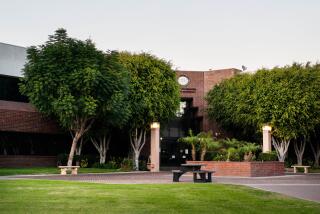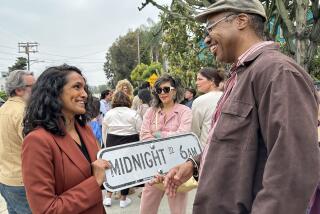Support for Gay Studies School Builds : Education: West Hollywood donates classroom space. Interest is high among prospective faculty.
- Share via
It was last fall when Simon LeVay and Christopher Patrouch realized that their idea of establishing a school dedicated to gay and lesbian studies was striking a chord in the gay community.
All they did was go to a movie while wearing T-shirts that said “Harvey Milk University”--and two women approached them and said they wanted to teach there.
At the time, Harvey Milk University, named after the slain San Francisco supervisor who was a hero to many gays, was only the embryo of an idea for the two men. But the immediate response was so positive that they decided to push ahead.
Now, their proposal--renamed the West Hollywood Institute of Gay and Lesbian Education--has picked up steam. On Monday, the West Hollywood City Council voted unanimously to provide free space in a city-owned building for an office and classrooms. The proposed school has also won the support of the Los Angeles Gay and Lesbian Community Services Center, and LeVay says he is hearing from gay and lesbian professors throughout the country wanting to teach at the institute.
If all goes as planned, it will open Sept. 8 and eventually evolve into a fully accredited university, similar in many respects to centers of higher education around the country for women, Catholics or blacks.
The project is generating particular excitement in the gay community because of LeVay’s involvement. He is the neuroscientist on leave from the Salk Institute in La Jolla who gained instant fame with his discovery indicating that homosexuality might be caused by anatomical differences in the brain.
The proposed institute--whose playful acronym WHIGLE belies what supporters say is its serious academic intent--would blend academic courses with extension-style classes, workshops and seminars. Also proposed are scholars-in-residence programs and opportunities for research.
Torie Osborn, executive director of the Los Angeles Gay and Lesbian Community Services Center, is among the enthusiastic supporters.
“I frankly think the combination of Simon LeVay’s name and credibility will ensure its success,” she said. “It’s been only in the past couple years that the gay and lesbian community has turned a corner. We’ve been so overwhelmed by AIDS that now we want to build something that’s positive and future-oriented. It’s a combination of the right timing and the right players.”
Patrouch said many gays--from all age groups and educational backgrounds--are expressing an interest in taking classes at the school. “Some want to do it for fun, some want to beef up their professional careers and some want to be in an environment that’s gay and lesbian friendly,” he said.
Although several colleges and universities have started gay and lesbian studies programs, and graduate degree programs in homophile studies have been offered for several decades through The One Institute in Los Angeles, the West Hollywood institute would be different in its independence and lack of admission standards.
The curriculum would consist of a core gay and lesbian culture program--with classes in science, social science, art and literature--along with a Los Angeles studies program and general extension courses, such as photography and physical education.
Open to anyone, the institute initially would not offer academic credit, but would grant certificates. LeVay said he expects it will offer 50 courses in the first academic year and have an enrollment of about 500.
The effort to establish the institute marks a new gay activism for LeVay--as well as a dramatic career change. Although openly gay all his adult life, LeVay said he has not been very active in the homosexual civil rights movement.
All that changed last fall, when he met Patrouch, 30, associate transportation planner with the city of West Hollywood, who had felt for some time that an education center would complement the cafes, bookstores and other gay-oriented establishments in a city where homosexuals make up about one-third of the population.
The two men met at a time when the Los Angeles gay community had been taking to the streets in unprecedented numbers to protest Gov. Pete Wilson’s veto of a gay civil rights bill. “I was psyched by how the city was engaged by this (activism), LeVay said.
To devote himself to the institute, however, necessitated a big change in his life--and it came on the heels of newfound fame generated by his finding that the segment of the hypothalamus in the brain that governs sexual behavior is half as large in homosexual men and heterosexual women as it is in heterosexual men.
A highly regarded neuroscientist even before this new research, the publication of his finding thrust him into the national spotlight and made him something of a hero at the prestigious Salk Institute in San Diego.
LeVay is taking a year’s leave of absence from Salk--his colleagues talked him out of resigning--and he has rented out his San Diego home and has moved to West Hollywood. He has no salary, but he says he has some savings and hopes to make money when his book, “The Sexual Brain,” is completed and published sometime this year.
A Cambridge University graduate, LeVay taught and conducted research for 12 years at Harvard University’s Medical School before joining Salk in 1984. He devoted most of his time to the field of visual research, but he changed direction about two years ago after his lover of 21 years died of AIDS.
His discovery ignited a furor--in both the straight and gay communities. Some gays congratulated him for giving credence to the notion that they were born gay, while others said it did not matter whether homosexuality was biological. Still others voiced concern about whether the information would be used to “fix defects,” and some lesbians were outraged that they were not included in the research.
On the whole, however, LeVay believes that the gay community is supportive of his work, and that his new fame will help him raise money for the school. Others agree.
“I think the notoriety is wonderful in getting people interested,” said Lauren Jardine, 45, who has left her job as programs director at the Gay and Lesbian Center to work with LeVay and Patrouch.
“What will sustain us is Simon has an excellent academic reputation,” she added.
Despite the support and excitement the project has generated, LeVay and his partners have several hurdles to clear. Even with the free space in the Werle Building, on Robertson Boulevard between Melrose Avenue and Santa Monica Boulevard, LeVay estimates about $300,000 will have to be raised for first-year operations. Salaries, maintenance, publicity and other expenses will only be partially covered by tuition, which is expected to be comparable to such programs as UCLA Extension, LeVay said.
Faculty members also have to be recruited. “That will be the least of our problems,” Jardine said.
Indeed, the school already has attracted interest from about 40 faculty members from across the country, including UCLA and USC. LeVay plans to teach a scientific course on sexual orientation designed, he says, to encourage discussion of diverse viewpoints.
Robert Dawidoff, chairman of the history department at Claremont Graduate School, said he is excited at the prospect of teaching at the institute.
“Although people can study gay and lesbian studies at Claremont, I don’t think the academy or university should be the only place where gay studies go on,” said Dawidoff, who is open about his homosexuality. “It should be in the community. Secondly, it should be gay-friendly where open discussions can go on.”
More to Read
Sign up for Essential California
The most important California stories and recommendations in your inbox every morning.
You may occasionally receive promotional content from the Los Angeles Times.













